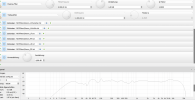Edit: Pops, clicks and distortion solved. Look at the 3rd edit of this post
Hello everyone,
I recently upgraded my home audio system and wanted to share my experience, hoping it might help others facing similar issues.
The Upgrade: I've set up a new surround sound system using my existing equipment and a new amplifier. An important change was connecting my PC directly to the TV via HDMI. This was prompted by LG's recent update that fixed the HDMI eARC audio PCM Passthrough issue, allowing 7.1 surround sound instead of just 2.1. This setup also helps avoid HDR desync and image loss problems.
Performance Improvement Tips: The setup works wonderfully, and I recommend it. Additionally, I found that disabling GSync improves visuals, as it causes gamma curve delays and isn't really beneficial if your refresh rate exceeds your panel's maximum.
The Main Issue - Audio Pops and Clicks: Despite the successful setup, I encountered an issue with audio pops and clicks, especially noticeable in calm, atmospheric music. This reminded me of a similar problem I had previously with my Intel 12700k CPU. At that time, Windows and eAPO routed the FIR-processing to the CPU's smaller cores, which sometimes weren't fast enough, causing audio disruptions. The temporary fix was to disable the e-cores.
Fast forward to 2023, I upgraded to an Intel 13700k, and initially, everything worked fine. However, with my new setup, I made two key changes:
Thanks for reading, and I appreciate any advice or thoughts you might have, even if it's a super niche problem.
Edit: The more I listen to music the more I feel as if there is also ... less distortion? May it actually be that the ecores couldn't process the FIR at all and the pop/clicks were just the worst manifestations? Weird.
Edit 2: Also for everyone using APO. Follow the tips in this thread: https://www.audiosciencereview.com/...nding-the-windows-audio-quality-debate.19438/ Disabling the Original APO made an audible improvement.
Edit 3: My initial solution was like throwing all car tires away just because one was slightly damaged. Instead of disabling all e-cores in the BIOS, a far more simple and effective solution is to use a free tool like "Process Lasso" and permanently assign the audio processes to the p-cores. and give them slightly higher priority. Also uninstall the "original APOs" in the Equalizer-APO. If you want no-compromise system performance for audio, also disable hyper-threading and raise the priority to realtime. But be careful with the latter one.
Hello everyone,
I recently upgraded my home audio system and wanted to share my experience, hoping it might help others facing similar issues.
The Upgrade: I've set up a new surround sound system using my existing equipment and a new amplifier. An important change was connecting my PC directly to the TV via HDMI. This was prompted by LG's recent update that fixed the HDMI eARC audio PCM Passthrough issue, allowing 7.1 surround sound instead of just 2.1. This setup also helps avoid HDR desync and image loss problems.
Performance Improvement Tips: The setup works wonderfully, and I recommend it. Additionally, I found that disabling GSync improves visuals, as it causes gamma curve delays and isn't really beneficial if your refresh rate exceeds your panel's maximum.
The Main Issue - Audio Pops and Clicks: Despite the successful setup, I encountered an issue with audio pops and clicks, especially noticeable in calm, atmospheric music. This reminded me of a similar problem I had previously with my Intel 12700k CPU. At that time, Windows and eAPO routed the FIR-processing to the CPU's smaller cores, which sometimes weren't fast enough, causing audio disruptions. The temporary fix was to disable the e-cores.
Fast forward to 2023, I upgraded to an Intel 13700k, and initially, everything worked fine. However, with my new setup, I made two key changes:
- I switched from using Audyssey to REW FIR + EAPO for audio processing on my PC.
- I significantly increased the number of FIR-using channels, currently 4.
Thanks for reading, and I appreciate any advice or thoughts you might have, even if it's a super niche problem.
Edit: The more I listen to music the more I feel as if there is also ... less distortion? May it actually be that the ecores couldn't process the FIR at all and the pop/clicks were just the worst manifestations? Weird.
Edit 2: Also for everyone using APO. Follow the tips in this thread: https://www.audiosciencereview.com/...nding-the-windows-audio-quality-debate.19438/ Disabling the Original APO made an audible improvement.
Edit 3: My initial solution was like throwing all car tires away just because one was slightly damaged. Instead of disabling all e-cores in the BIOS, a far more simple and effective solution is to use a free tool like "Process Lasso" and permanently assign the audio processes to the p-cores. and give them slightly higher priority. Also uninstall the "original APOs" in the Equalizer-APO. If you want no-compromise system performance for audio, also disable hyper-threading and raise the priority to realtime. But be careful with the latter one.
Attachments
Last edited:

